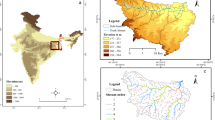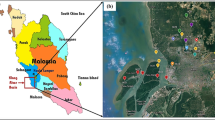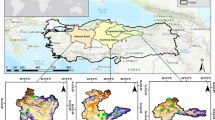Abstract
Rainfall is one of the most complex phenomena occurring on earth to study with extreme and advanced soft computing engine that can perform well with adaptive perception. Here, in this study, an attempt has been made to study the behaviour of rainfall in Chennai district, Tamil Nadu, India, using wavelet tool. Wavelet is one of the prominent tools for analysing the data in various ways. One such technique called multiresolution wavelet analysis is implemented here to study the pattern of rainfall in Chennai. This approach applied to the data works well for and can be implemented for complex data. The above approach fits not only to simple data but also for complex data. Rainfall data from 2001 to 2017 have been taken into account for studying the pattern. The influence of change due to groundwater is investigated in different criteria, and future threats posed by climate change are also analysed. The key factors involved in understanding climate change and hydrological regime of groundwater were identified, and the residents of the Chennai locality could plan for better management methodologies, especially for those who are residing in coastal regions of the district. Better management methodologies with recommendations are suggested to attain sustainability in groundwater resources. The research was carried out based on sustainable groundwater managements for 12th plan, submitted to planning commission of India. The reports state that in 2004, 28% of India’s blocks were showing alarmingly high levels of groundwater use.



















Similar content being viewed by others
References
Adamowski J (2007) Development of a short-term river flood forecasting method based on wavelet analysis. Warsaw Polish Academy of Sciences Publication, p. 172
Adamowski J (2008a) Development of a short-term river flood forecasting method for snowmelt driven floods based on wavelet and cross-wavelet analysis. J Hydrol 353(3–4):247–266
Adamowski J (2008b) River flow forecasting using wavelet and cross-wavelet transform models. J Hydrol Process 25:4877–4891
Adamowski J, Sun K (2010) Development of a coupled wavelet transform and neural network method for flow forecasting of non-perennial rivers in semi-arid watersheds. J Hydrol 390(1–2):85–91
Amara Graps (1995) IEEE Computational Science and Engineering, Summer 1995,vol. 2, num. 2, published by the IEEE Computer Society, 10662 Los Vaqueros Circle, Los Alamitos, CA 90720, USA
Arora M, Goel NK, Singh P (2005) Evaluation of temperature trends over India. Hydrol Sci J 50(1):81–93
Bovolo CI, Parkin G, Sophocleous M (2009) Groundwater resources, climate and vulnerability. Environ Res Lett 4:035001
Burn DH, Cunderlik JM, Pietroniro A (2004) Hydrological trends and variability in the Liard river basin. Hydrol Sci J 49:53–67
Cannas B, Fanni A, See L, Sias G (2006) Data preprocessing for river flow forecasting using neural networks: wavelet transforms and data partitioning. Phys Chem Earth 31(18):1164–1171
CGWB Technical Report (2008) District groundwater brochure Chennai district Tamil Nadu. pp 1–1
Chaudhary A, Abhyankar VP (1979) Does precipitation pattern foretell Gujarat climate becoming arid. Mausam 30:85–90
Dai XG, Wang P, Chou JF (2003) Multiscale characteristics of the rainy season rainfall and interdecadal decaying of summer monsoon in North China. Chin Sci Bull 48(24):2730–2734
Dash SK, Jenamani RK, Kalsi SR, Panda SK (2007) Some evidence of climate change in twentieth-century India. Climatic Change 85:299–321
Douglas EM, Vogel RM, Knoll CN (2000) Trends in flood and low flows in the United States: impact of spatial correlation. J Hydrol 240:90–105
Dragoni Walter, Sukhija BS (2008) Climate change and groundwater—A short review. In: Dragoni W, Sikhija BS (eds) Climate change and groundwater, vol 288. Geological Society, Special Publications, London, pp 1–12
U.S. Geological Survey(2007a), Climate variability and change: U.S. Geological Survey Fact Sheet 2007–3108, 2 p
Ghil Michael (2002) Natural climate variability. In: MacCraken MC, Perry JS (eds) Encyclopedia of global environmental change—Volume 1, The Earth system—Physical and chemical dimensions of global environmental change. Wiley, Chichester, pp 544–549
Gong H, Pan Y, Xu Y (2012) Spatio-temporal variation of groundwater recharge in response to variability in precipitation, land use and soil in Yanqing Basin, Beijing, China. Hydrogeol J 20:1331–1340
Goswami BN, Venugopal V, Sengupta D, Madhusoodanam MS, Xavier PK (2006) Increasing trends of extreme rain events over India in a warming environment. Science 314:1442–1445
Gurdak JJ, Hanson RT, McMahon PB, Bruce BW, McCray JE, Thyne GD, Reedy RC (2006) Climate variability controls on unsaturated water and chemical movement, high plains aquifer, USA. Vadose Zone J 6:533–547
Hanson RT, Newhouse MW, Dettinger MD (2004) A methodology to assess relations between climatic variability and variations in hydrologic time series in the southwestern United States. JHydrol 287:252–269
Hanson RT, Dettinger MD, Newhouse MW (2006) Relations between climatic variability and hydrologic time series from four alluvial basins across the southwestern United States. Hydrogeol J 14:1122–1146
Hayashi M, Farrow CR (2014) Watershed-scale response of groundwater recharge to inter-annual and inter-decadal variability in precipitation (Alberta, Canada). Hydrogeol J 22:1825–1839
India Metrological department (1973) Northeast monsoon; FMU Rep.no.iv:18.4.Intergovernmental Panel on Climate Change, 2007, Climate change 2007—Impacts, adaptation and vulnerability. In: Parry ML, Canziani OF, Palutikof JP, van der Linden PJ, Hanson CE (eds) Contribution of Working Group II to the Fourth Assessment Report of the Intergovernmental Panel on Climate Change. Cambridge University Press, Cambridge, p 976
Jagannadha Sarma VV (2005) Rainfall pattern in the coastal zone of Krishna Godavary basin Andhra Pradesh India. J Appl Hydrol 18:111
Jagannathan P, Parthasarathy B (1973) Trends and periodicities of rainfall over India. Monthly Weather Rev 101:371–375
Jameson Shazade (2014) Flood management does not exist: assembling flood governance through knowledge management in Chennai. University of Amsterdam, Amsterdam
Kendall MG (1975) Rank correlation methods. Charles Griffin, London
Khan TMA, Singh OP, Sazedur Rahman MD (2000) Recent sea level and sea surface temperature trends along the Bangladesh coast in relation to the frequency of intense cyclones. Mar Geodesy 23:103–116
Khan MYA, Gani KM, Chakrapani GJ (2016a) Assessment of surface water quality and its spatial variation. A case study of Ramganga River, Ganga Basin. India. Arab J Geosci 9:28
Khan MYA, Khan B, Chakrapani GJ (2016b) Assessment of spatial variations in water quality of Garra River at Shahjahanpur, Ganga Basin, India. Arab J Geosci 9:516
Khan MYA, Daityari S, Chakrapani GJ (2016c) Factors responsible for temporal and spatial variations in water and sediment discharge in Ramganga River, Ganga Basin, India. Environ Earth Sci 75:283
Khan MYA, Gani KM, Chakrapani GJ (2017) Spatial and temporal variations of physicochemical and heavy metal pollution in Ramganga River—a tributary of River Ganges, India. Environ Earth Sci 76:231
Kisi O (2008) Stream flow forecasting using neuro-wavelet technique. Hydrol Process 22(20):4142–4152
Kisi O (2011) Wavelet regression model as an alternative to neural networks for river stage forecasting. Water Resour Manag 25(2):579–600
Koteswaram P, Alvi SMA (1969) Secular trends and periodicities in rainfall at west coast stations in India. Curr Sci 38:229–231
Kumar V, Jain SK (2010) Trends in seasonal and annual rainfall and rainy days in Kashmir valley in the last century. Quater Int 212:64–69
Kumar V, Jain SK (2011) Trends in rainfall amount and number of rainy days in river basins of India (1951–2004). Hydrol Res 42(4):290–306
Kumar V, Singh P, Jain SK (2005) Rainfall trends over Himachal Pradesh, Western Himalaya, India. In: Development of hydro powerprojects – a prospective challenge. Conference, Shimla, 20–22
Kumar V, Jain SK, Singh Y (2010) Analysis of long-term rainfall trends in India. Hydrol Sci J 55(4):484–496
Lakshmi K (2014) Third and fourth desal plants await state nod. The Hindu, July 2
Lal M (2001) Climatic change – implications for India’s water resources. J Indian Water Resource Soc 21:101–119
Lal M (2003) Global climate change: india’s monsoon and its variability. J Environ Stud Policy 6:1–34
Lettenmaier DP, Wood EF, Wallis JR (1994) Hydroclimatological trends in the continental United States, 1948–88. J Clim 7:586–607
Mallat SG (2009) Denoising. In: Mallat SG (ed) A wavelet tour of signal processing: the Sparse way. Elsevier, Amsterdam, pp 535–606
Mann HB (1945) Nonparametric tests against trend. Econometrica 13:245–259
MATLAB(2010) TheMathWorks Inc., Natick, MA
Min SK, Kwon WT, Park EH, Choi Y (2003) Spatial and temporal comparisons of droughts over Korea with East Asia. Int J Climatol 23:223–233
Mirza MQ (2002) Global warming and changes in the probability of occurrence of floods in Bangladesh and implications. Global Environ Change 12:127–138
Mooley DA, Parthasarthy B (1984) Fluctuations of all India summer monsoon rainfall during 1871–1978. Clim Change 6:287–301
Pai DS (2003) Tele connections of Indian summer monsoon with global surface air temperature anomalies. Mausam 54(2):407–418
Pant GB, Kumar KR (1997) Climates of South Asia. Wiley, Chichester
Partal T (2009) River flow forecasting using different artificial neural network algorithms and wavelet transform. Can J Civ Eng 36(1):26–38
Partal T, Kahya E (2006) Trend analysis in Turkish precipitation data. Hydrol Process 20:2011–2026
Partal T, Kisi O (2007) Wavelet and neuro-fuzzy conjunction model for precipitation forecasting. J Hydrol 342:199–212
Raghavendra VK (1974) Trends and periodicities of rainfall in subdivisions of Maharashtra state. Indian J Meteorol Geophys 25:197–210
Rao YP (1976) South west monsoon. Meteorological Monograph, Synoptic Meteorology, India Meteorological Department p. 367
Rao YP (1981) The climate of the Indian subcontinent. In: Takahasi H, Arakawa K (eds) World survey of climatology, Vol. 9. Elsevier, Amsterdam, pp 67–182
Samuel Roumeau (2012) The challenges of water governance to build resilient cities: the case study of the IT corridor in Chennai. Chance to sustain report, March, India, p 2012
Samuel Roumeau, Aicha Seifelislam, Shazade Jameson, Loraine Kennedy (2015) Water governance and climate change issues in Chennai. HAL 01144122, HAL
Sen PK (1968) Estimates of the regression coefficient based on Kendall’s tau. J Am Stat Assoc 63:1379–1389
Shrestha AB, Wake CP, Dibb JE, Mayewski PA (2000) Precipitation fluctuations in the Nepal Himalaya and its vicinity and relationship with some large scale climatological parameters. Int J Climatol 20:317–327
Singh P, Kumar V, Thomas T, Arora M (2008a) Changes in rainfall and relative humidity in different river basins in the northwest and central India. Hydrol Process 22:2982–2992
Singh P, Kumar V, Thomas T, Arora M (2008b) Basin-wise assessment of temperature variability and trends in the northwest and central India. Hydrol Sci J 53:421–433
Slimani S, Massei N, Mesquita J, Valdés D, Fournier M, Laignel B, Dupont JP (2009) Combined climatic and geological forcings on the spatio-temporal variability of piezometric levels in the chalk aquifer of Upper Normandy (France) at pluridecennal scale. Hydrogeol J17:1823–1832
Stanley Raj A, Hudson Oliver D, Srinivas Y, Viswanath J (2017) Wavelet based analysis on rainfall and water table depth forecasting using Neural Networks in Kanyakumari district, Tamil Nadu, India”. Groundwater Sustain Manag 5:178–186
Stanley Raj A, Josephine Usha R, Akshaya S, Saranya K, Shyamilee D (2020) Artificial Neural Network Model for Rainfall Data Analysis During 2004-2017 in Tamil Nadu, India—Prevailing Pattern Evaluation on Climate Change. J Model Based Res 1(2):34–47
Thapliyal V, Kulshrestha SM (1991) Decadal changes and trends over India. Mausam 42:333–338
Theil H (1950) A rank—invariant method of linear and polynomial regression analysis. Nederlandse Akademie Wetenchappen Series A 53:386–392
Tiwari VM, Wahr J, Swenson S (2009) Dwindling groundwater resources in northern India, from satellite gravity observations. Geophys Res Lett 36:1–5
Treidel H, Martin-Bordes JJ, Gurdak JJ (Eds.) (2012) Climate Change Effects on Groundwater Resources: A Global Synthesis of Findings and Recommendations. International Association of Hydrogeologists (IAH)—International Contributions to Hydrogeology.Taylor& Francis publishing, p 414
Uddameri V (2007) Using statistical and artificial neural network models to forecast potentiometric levels at a deep well in South Texas. Environ Geol 51(6):885–895
Vennila G (2007) Rainfall variation analysis of vattamalaikarai sub basin, Tamil Nadu. Journal of applied hydrology Vol.XX.No.3. pp.5059
Wada Y, van Beek LPH, BierkensMFP(2012)Nonsustainable groundwater sustaining irrigation: a global assessment. Water Resource Res 48.http://dx.doi.org/10.1029/2011WR010562
Wang W, Jin J, Li Y (2009) Prediction of inflow at Three Gorges Dam in Yangtze River with wavelet network model. Water Resour Manage 23(13):2791–2803
Wang SW, Gong DY, Ye JL (2000) Seasonal Rainfall series of Eastern China since 1880 and the variability. Acta Geograph Sin (in Chinese) 55(3):281–293
https://www.indiawaterportal.org/geographical-resolution/district?page=1
Yue S, Hashino M (2003) Temperature trends in Japan: 1900–1990. Theor Appl Climatol 75:15–27
Acknowledgement
The authors would like to thank the Physics department and the management of Loyola College for giving the opportunity to publish this article.
Author information
Authors and Affiliations
Corresponding author
Ethics declarations
Conflict of interest
The authors declare that they have no conflict of interest.
Additional information
Publisher's Note
Springer Nature remains neutral with regard to jurisdictional claims in published maps and institutional affiliations.
Rights and permissions
About this article
Cite this article
Raj, A.S., Oliver, D.H., Srinivas, Y. et al. The impact of rainfall on groundwater table in Chennai city, India: GIS and wavelet approach. Sustain. Water Resour. Manag. 6, 85 (2020). https://doi.org/10.1007/s40899-020-00447-y
Received:
Accepted:
Published:
DOI: https://doi.org/10.1007/s40899-020-00447-y




